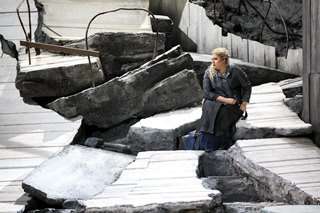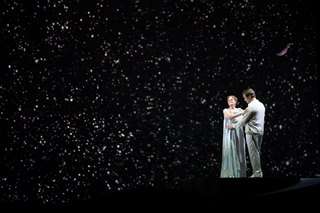|
Back
The Musical Event of the Season in Chicago Chicago
Lyric Opera
11/13/2016 - & November 17, 21*, 26, December 3, 2016
Hector Berlioz: Les Troyens
David Govertsen (Priam, Fantôme de Priam), Catherine Martin (Hécube, Fantôme d’Hécube), Christine Goerke (Cassandre, Fantôme de Cassandre), Bradley Smoak (Fantôme d’Hector), Holly Curran (Andromaque), Corey Bix (Helenus), Brandon Jovanovich (Enée), Annie Rosen (Ascagne), Philip Horst (Panthée), Takaoki Onishi (Un soldat troyen), Lucas Meachem (Chorèbe, Fantôme de Chorèbe), Patrick Guetti (Un capitaine grec), Susan Graham (Didon), Okka von der Damerau (Anna), Christian Van Horn (Narbal), Mingjie Lei (Iopas), Jonathan Johnson (Hylas), Kenneth Nichols, Nikolas Wenzel (Deux soldats troyens)
Lyric Opera of Chicago Chorus, Michael Black (Chorus master), Lyric Opera of Chicago Orchestra, Sir Andrew Davis (Conductor)
Tim Albery (Director), Tobias Hoheisel (Set and costume designer), David Finn (Lighting designer), Illuminos (Projection design), Helen Pickett (Choreographer), August Tye (Ballet mistress)

C. Goerke (© Todd Rosenberg)
This production of Les Troyens was the musical event of the season in Chicago. Prior to the performance, one could sense the excitement and even hear enthusiastic comments by some in the audience. Les Troyens is such an expensive and demanding affair to mount. It requires a heroic tenor as Aeneas and two first rate mezzos or dramatic sopranos as Cassandra and Dido, a score of supporting roles, a huge chorus, ballet dancers, a Wagnerian size orchestra and possibly the hardest of all, grandiose sets worthy of Troy and Carthage. Worldwide, there are about three productions of the epic opera mounted per season. Kudos to the Lyric Opera of Chicago for having undertaken such a lofty project.
In the first portion of the opera, La Prise de Troie, Christine Goerke, one of very few sopranos today that does justice to Brünnhilde and other demanding Wagnerian and Straussian roles, was the Cassandra. And what a Cassandra she was! Goerke was incandescent as the doomed soothsayer. As expected, she displayed excellent technique and ease in the high notes. Moreover, for a singer who mostly sings German repertoire, her French was clear and idiomatic. The sets of the besieged Troy looked like a broken structure, possibly a tower in the city’s high walls, and the costumes seemed like 1950s Communist Eastern Europe, grey and gloomy. It may be that stage director Tim Albery’s vision of Antiquity’s monarchies is one of rigid societies that resemble a beehive where individuals such as Cassandra, Aeneas and Dido and their personal passions count for very little. All is for the good of the collective.
King Priam, sung by bass-baritone David Goversten, was portrayed as old and excessively frail, an allusion to his soon to perish kingdom city. Priam performed a curious foot washing ceremony on some soldiers. This biblical allusion of extreme humility was visually riveting but of little pertinence to the plot. The production’s language coach must be congratulated as the entire cast and the chorus sang in idiomatic, easily understandable French, a rarity in today’s operatic world. Lucas Meachem as Cassandra’s fiancé Chorèbe was moving in his vocally effortless imploring “Reviens à toi, vierge affligée”. Brandon Jovanovich as Aeneas had difficulty with high notes as he announced the procession of the Greeks’ horse into the city. Instead of using a cumbersome and costly wooden structure, a menacing black shadow with the shape of a horse’s head advanced through the stage. The spectacle of Cassandra helplessly watching the menacing shadow was frightfully foreboding. The most moving and memorable scene was Cassandra’s instigation of the Trojan women to take their own lives rather than be captured and sullied by the Greeks. Goerke’s slow movement towards the terrified Trojan women was awe inspiring and reassuring. Her recoiling from the cowardly ones who preferred slavery was effective in swaying several of them. Her emphasis on words such as “Thessaliennes, lâche menace, ivres de sang” and “rapace” was on the spot and convincing. No excess in movement was the key to her nobility and stoic deportment. This made the horrendous collective suicide look like a painting by Ingres or Delacroix.

S. Graham, B. Jovanovich (© Todd Rosenberg)
The second portion of the work, Les Troyens à Carthage, opens with the laudatory chorus “Gloire à Didon” sung by the Carthaginian populace, as grey and drab as the Trojans, and led by a chorus master in the presence of Dido, dressed in a Margaret Thatcher dress suit, looking more Comrade than Queen. As in La Prise de Troie, the drab costumes evoke the life devoid of love that Dido has led since her husband’s death. Susan Graham’s voice was less fresh in her opening “Nous avons vu sept ans à peine”, and she had shrill top notes in the following “Chers Tyriens”. There was a beautiful blending of two mezzo voices in Dido’s duet with her sister Anna sung by Okka von der Damerau. There was something touching in the initial interaction of Dido and Aeneas, both in their drab sad costumes. Perhaps Dido, herself a refugee from the Phoenician city of Tyre, recognized and empathized with Aeneas’ uprooting and quest for a new home. In Jovanovich’s stentorian announcing “Reine, je suis Enée”, it is hard to see how Dido would not fall for such a dashing Aeneas. As the Trojans are getting ready to fight the Numidians on Dido’s behalf, lighting designer David Finn uses light and shadow splendidly. By gradually altering the lighting, the shadow of the Trojan warriors becomes bigger and bigger announcing their upcoming victory.
In the fourth act, after Aeneas’s victory over the native Numidians, a reassured Dido dreams of cascades with dancing nymphs and athletic young men pursuing them. This mountainous setting is reminiscent of Dido’s native Phoenicia (today’s Lebanon) and evokes love and sensuality. Dido’s Councillor Narbal, effortlessly sung by bass-baritone Christian van Horn, and her sister Anna quibble over the change in Dido’s state of mind, with Narbal expressing concern and Anna rejoicing for her sister’s love of Aeneas. A celebration follows during which young Iopas, sung by tenor Mingjie Lee, sings a moving ode to nature showing off his clear lyric tenor voice. The drab clothes are changed into Gatsby-like evening dresses indicating an end of Dido’s loneliness. The exquisite septet “Tout n’est que paix et charme autour de nous!” is proof of Berlioz’s gift for harmony. The act ends blissfully with the glorious love duet “Nuit d’ivresse et d’extrême extase” where both Jovanovich and Graham are in great voice. To the delight of the public, the set is transformed into a starry night sky. As the two lovers leave the stage, the planets in the starry sky are misaligned and Hector’s ghost is calling “Italie”, reminding Aeneas of his duty to rebuild Troy in a new land. According to some regulars, the delight was not just for Tobias Hoheisel’s beautiful sets but also for the Lyric Opera showing off its new rotating stage in this scene. In the final act, Aeneas expresses his struggle between love and duty in “Je dois quitter Carthage”. His voice becomes hoarse towards the end of the demanding scene. In “Va, ma sœur, et l’implorer” as especially in “Vénus, rends-moi ton fils”, Graham exaggerates Dido’s emotional destruction with melodramatic declamations, possibly in an attempt to compensate for vocal uncertainties. Such excess, hinging on verismo, is not compatible with Berlioz’s music. Sir Andrew Davis conducted with aplomb and an evident love of this music. He definitely has an understanding and a passion for Berlioz.
Ossama el Naggar
|